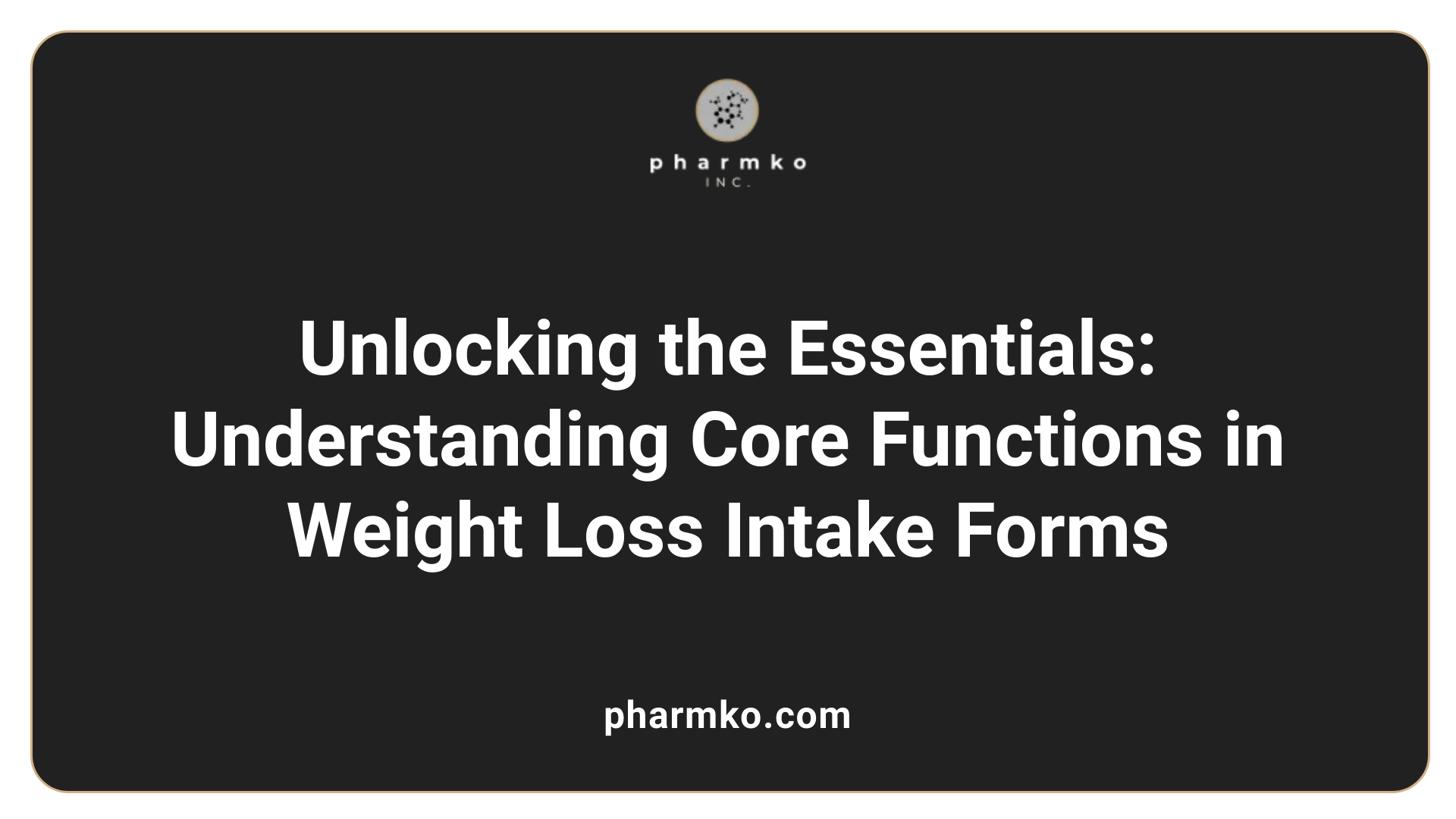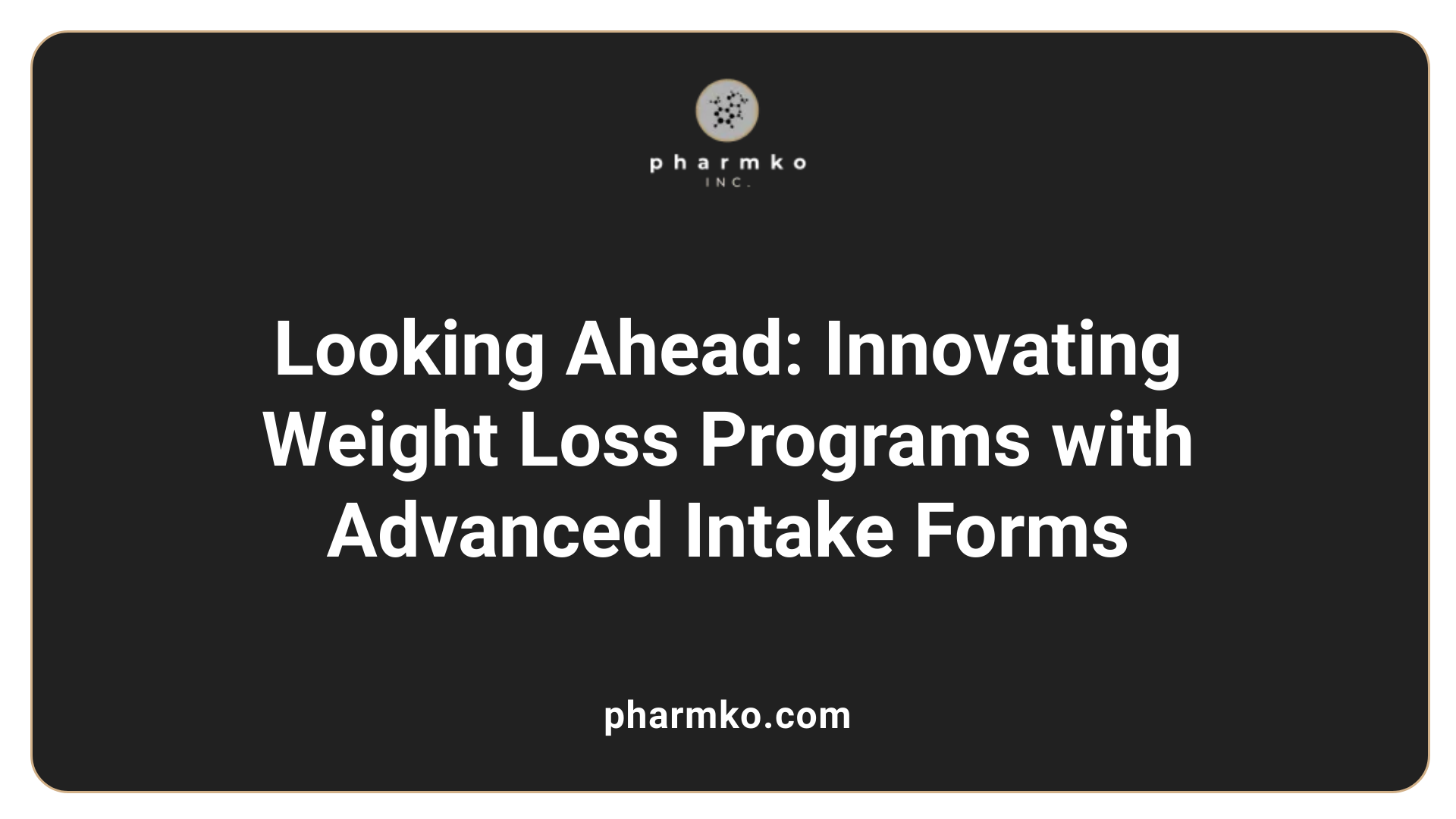How do intake forms work for weight loss programs?
Understanding Intake Forms in Weight Loss Programs
Intake forms are indispensable tools used in weight loss programs to gather crucial patient data, ensuring each individual's needs are met with precision. By collecting comprehensive information about a client's health, lifestyle, and goals, these forms lay the foundation for a personalized weight management approach. As the first point of contact, they significantly influence the effectiveness and personalization of the entire treatment plan.
The Core Functions of Weight Loss Intake Forms

How do intake forms work for weight loss programs?
Intake forms for weight loss programs serve as a critical tool for gathering essential information about a client's medical history, current health status, and specific weight loss goals. They include targeted questions about nutrition, lifestyle practices, stress levels, and psychological readiness for change. By having clients complete these forms online before appointments, healthcare providers streamline information collection, enhancing the patient experience.
This thorough intake process establishes a strong foundation for effective coaching sessions. It enables open discussions about personal challenges and helps ensure treatment plans are customized to meet each client’s individual needs. Ultimately, these forms facilitate better communication and lead to improved outcomes in weight management.
What is the purpose of an intake form in a weight loss program?
The primary purpose of an intake form in a weight loss program is to systematically gather vital information about clients. This information is essential for understanding their unique needs and circumstances. The structured format fosters an effective provider-client relationship while allowing for tailored program planning.
Best practices for designing these forms involve using clear language, maintaining logical flow, and ensuring accessibility for all clients. This not only enhances the user experience but also significantly reduces manual data entry, improving organization and efficiency within the onboarding process.
Overall, an effective intake form helps set clear expectations regarding the weight loss journey, promoting better communication and ultimately leading to desirable outcomes.
Gathering Detailed Client Information for Effective Personalization

What information is typically collected through weight loss intake forms?
Weight loss intake forms typically collect a variety of information to assess a patient's needs and establish a personalized weight loss plan. Key areas include:
- Personal Demographics : Name, contact information, sex, birthdate, height, weight, race, and marital status.
- Weight History : Highest and lowest adult weights, previous weight loss attempts, and reasons for seeking treatment.
- Dietary Habits : Information gathered through a 24-hour food recall and questions about past diets.
- Physical Activity : Details of current exercise patterns and assessments of lifestyle factors.
- Sleep Patterns : Inquiries that highlight potential sleep issues impacting weight management.
- Psychological Factors : Questions addressing stress, mood, and mental health issues.
- Medical History : Current medications, allergies, and relevant medical conditions.
This comprehensive data collection is essential for tailoring effective treatment plans.
How do intake forms contribute to personalizing weight loss treatment plans?
Intake forms play a vital role in personalizing weight loss treatment plans by collecting comprehensive patient information. This includes health history, lifestyle habits, and individual goals. The data helps health professionals design tailored strategies that address specific challenges and preferences, leading to more effective outcomes.
- Technology Integration : Tools like remote monitoring devices enhance data capture for real-time adjustments to the treatment plan.
- Client Engagement : Automating the intake process improves adherence by ensuring timely and efficient onboarding experiences.
Overall, well-structured intake forms foster individualized care, making clients feel valued while streamlining the development of personalized weight loss plans.
Significance of accurate information
Accurate information gathered from intake forms is crucial for effective weight loss management. It aids in:
- Identifying immediate coaching needs and underlying factors that may contribute to weight struggles.
- Evaluating client strengths and limitations to inform tailored strategies.
- Assessing suitability for medication-assisted programs based on comprehensive medical evaluations.
This foundation enhances the client-provider relationship, ensuring strategies are aligned with client needs for optimal success in weight loss initiatives.
Enhancing Client Onboarding Through Structured Intake Forms

How does the structure of weight loss intake forms enhance the client's onboarding experience?
The structured weight loss intake forms enhance the client's onboarding experience by systematically gathering essential personal and medical information, which facilitates personalized care. By providing options for various dietary plans and including sections for exercise regimens, the forms help clients feel understood and supported in their weight loss journey.
Additionally, the separation of measurements and the inclusion of obesity classification categories enable healthcare providers to tailor interventions based on the severity of the individual’s condition. Clients share insights about their weight history, previous diets, and physical activity levels, which are crucial for crafting suitable strategies moving forward.
Moreover, the inclusion of questions focusing on lifestyle factors such as stress management and sleep patterns allows for a holistic view of the client’s health. The emphasis on documenting past experiences with weight management not only highlights potential challenges but also informs the coach's approach to fostering motivation.
Ultimately, the structured design of these forms creates a comprehensive framework that aligns with the client's goals and helps establish a clear, systematic approach to weight management right from the start.
Harnessing Insightful Data for Strategic Weight Loss Planning
What impact do completed intake forms have on the assessment and planning of weight loss strategies?
Completed intake forms have a significant impact on the assessment and planning of weight loss strategies, especially for patients considering medication-assisted treatments like Semaglutide. These forms collect essential personal information, motivations for seeking weight loss, and insights into past weight management attempts. This data serves as a foundation for tailoring treatment recommendations to each individual's needs and history.
Moreover, the medical history section of the form identifies contraindications or health conditions that may affect the safety and efficacy of the weight loss medications. This personalized approach ensures that healthcare providers can make informed decisions such as appropriate dosage adjustments, dietary recommendations, and monitoring for potential side effects.
How do intake forms improve strategic planning?
The integration of lifestyle assessments in the intake forms, including physical activity levels, sleep patterns, and stress management, helps healthcare providers understand factors affecting weight management. By documenting a client's dieting history, adherence to previous weight loss efforts, and personal strengths or limitations, coaches can develop comprehensive and effective weight loss strategies tailored to individual circumstances.
Table: Impact of Intake Forms on Weight Loss Programs
| Area of Inquiry | Purpose | Outcome |
|---|---|---|
| Personal Information | Understand motivations and goals | Tailored treatment |
| Medical History | Identify health conditions and contraindications | Safe medication use |
| Lifestyle Assessment | Evaluate exercise habits and stress management | Personalized plans |
| Diet History | Gain insights into dietary behaviors | Improved adherence |
Overall, the use of detailed intake forms shapes a comprehensive understanding of the patient's journey, fostering a stronger partnership between providers and clients in the pursuit of successful weight loss.
Benefits for Health Coaches and Nutritionists Through Targeted Intake Processes
Why is accurate information in intake forms crucial for effective weight management?
Accurate information in intake forms is crucial for effective weight management because it provides healthcare providers with a comprehensive understanding of the patient's medical history, dietary habits, and previous weight loss efforts. This foundational knowledge facilitates the creation of personalized treatment plans tailored to each person's unique challenges.
By documenting aspects such as weight history and physical activity, healthcare providers can track progress and adjust plans as needed. The better the insights into a client's lifestyle and motivations, the more effective the strategies can be for sustainable weight loss. This structured approach promotes collaboration and accountability between the client and the provider, ultimately enhancing motivation and leading to more positive outcomes.
How can health coaches and nutritionists benefit from using client intake forms?
Health coaches and nutritionists significantly benefit from client intake forms as they help gather essential information about a client's health history, lifestyle habits, and wellness goals. This structured intake process streamlines initial coaching sessions and reinforces a professional image, thereby boosting client confidence.
Customization of intake forms is vital, allowing coaches to prioritize relevant health-related questions. This capability leads to personalized health improvement plans tailored to specific client needs. Moreover, the insightful data gathered facilitates deeper conversations about strengths and challenges, crucial for setting actionable goals. Ultimately, comprehensive intake forms foster a strong coach-client relationship, ensuring effective and personalized coaching.
| Benefits of Intake Forms | Description |
|---|---|
| Establish client needs accurately | Identifies individual challenges and goals for tailored strategies. |
| Streamlines coaching sessions | Saves time and enhances focus on critical issues during consultations. |
| Fosters client confidence in the coaching process | Professional appearance promotes trust and willingness to engage. |
| Enables personalized health improvement plans | Customized strategies align with clients' unique lifestyle and health factors. |
The Technical Side: Designing Effective and Efficient Weight Loss Intake Forms
What is the best way to create a weight loss intake form?
Creating an effective weight loss intake form starts with selecting the right format—either as a printable document or an online form. The choice depends on the specific needs of your practice and the preferences of your clients.
Key elements to include are:
- Basic Client Information: Start with contact details and personal data to establish a client profile.
- Weight Loss Goals: Ask participants about their individual goals, motivations, and history with weight loss efforts. This helps tailor guidance accordingly.
- Challenges: Inquire about factors that may hinder their progress, such as previous dieting experiences or lifestyle habits.
Enhancing Client Experience
Tailoring questions specific to weight loss services significantly enhances the relevance of the data collected. Including sections on physical activity, dietary habits, stress levels, and sleep patterns will provide a comprehensive view of the client's situation.
Incorporating digital solutions can streamline the onboarding process. For instance, using electronic forms allows clients to complete intake seamlessly from any device, improving efficiency and accessibility, while automation prompts enhance completion rates.
Digital Solutions
Platforms like Healthie enable providers to customize forms for different client categories, thus improving the effectiveness of the data gathering process. This not only builds a strong foundation for the client-provider relationship but also respects the confidentiality of sensitive information. Making sure to maintain HIPAA compliance during data handling also builds trust, ensuring a secure onboarding experience.
Maintaining Privacy and Boosting Compliance with Modern Intake Processes

Privacy Considerations
When it comes to weight loss treatment, client privacy is paramount. Intake forms must adhere to HIPAA compliance, ensuring that personal data is securely handled. This commitment not only builds trust but also fosters an environment where clients feel safe sharing sensitive health information, making them more likely to engage fully with the program.
Digital Compliance Solutions
In today's digital age, automating the intake process is a significant advantage. Platforms like Healthie allow providers to create tailored intake forms that clients can complete on any device at their convenience. This approach increases compliance, reduces the risk of late cancellations, and makes the onboarding experience smooth and efficient. These electronic forms can dynamically adapt based on the responses given, enhancing the personalization of the onboarding experience.
Improving Client Engagement
By implementing a modern intake process, healthcare providers can significantly improve client engagement. With clear, structured questions related to their health history, lifestyle, and weight loss goals, clients are more likely to articulate their needs. This comprehensive understanding of clients' backgrounds helps coaches tailor specific strategies that align with individual circumstances, leading to more effective weight loss management. As a result, clients feel more invested in their health journey, knowing that their unique needs and goals are being prioritized.
The Future of Weight Loss Programs: Enhanced Through Innovative Intake Forms

Future Trends in Weight Loss Programs
The future of weight loss programs is set to be increasingly personalized, thanks to innovative intake forms. These forms not only gather essential client data but also adapt to the evolving needs and preferences of individuals seeking weight loss solutions. With a greater emphasis on customization, programs will be able to tailor interventions to suit specific health histories, dietary habits, and lifestyle preferences, ultimately leading to more effective outcomes.
Innovations in Client Assessments
Innovative assessment techniques are emerging, such as digital health tools that streamline the intake process. By utilizing apps that allow clients to submit their information seamlessly from any device, the onboarding experience becomes more user-friendly. These assessments can also include detailed questions regarding physical activity, nutrition, and psychosocial factors, presenting a comprehensive view of each client's unique challenges.
Technology Integration
The integration of advanced technology into the weight loss intake process is crucial. For instance, automation tools can simplify form completion, improve client compliance, and reduce administrative burdens. Moreover, platforms that allow healthcare providers to customize forms and workflows based on various client needs will enhance service delivery. Such innovations will also bolster HIPAA compliance through secure data handling practices, reinforcing trust and privacy between clients and providers.
| Aspect | Current State | Future Vision |
|---|---|---|
| Client Onboarding | Manual and often cumbersome processes | Automated, user-friendly systems |
| Assessment Techniques | Standardized forms | Tailored questions integrating technology |
| Technology Use | Basic tools for communication | Comprehensive digital health solutions |
Conclusion: The Integral Role of Intake Forms in Weight Loss Success
Weight loss intake forms are not only administrative necessities but pivotal tools in cultivating personalized and effective weight management plans. By meticulously collecting and analyzing patient information, these forms facilitate a deeper understanding of individual needs, leading to tailored strategies that address specific challenges. Health professionals can significantly enhance patient outcomes by ensuring that intake forms are comprehensive, precise, and integrated with advanced digital platforms, maintaining privacy and improving compliance through seamless electronic submissions. By utilizing well-designed intake forms, weight loss programs can continually evolve, leveraging data-driven insights to refine strategies and optimize results, ensuring that each patient's journey is as unique and successful as possible.
References
- [PDF] UNC Physicians Network Medical Weight Clinics Intake Form
- Client Intake Form for Health Coaches - Precision Nutrition
- How to create a weight loss onboarding form in 2024 - Formsort
- How to Automate Your Wellness Business - Healthie
- Medication-assisted Weight Loss Intake Form - Hydrafuse
- How Form Health Works | Medical Weight Loss Treatment
- [PDF] UNC Physicians Network Medical Weight Clinics Intake Form













